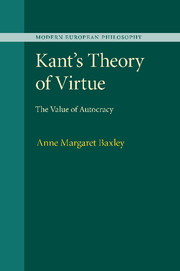Book contents
- Frontmatter
- Contents
- Acknowledgments
- Abbreviations and translations
- Introduction
- 1 The good will, moral worth, and duty: concerns about Kant's rationalist moral psychology
- 2 Kant's conception of virtue and the autocracy of pure practical reason
- 3 Virtue, human nature, and moral health: Kant's dispute with Schiller
- 4 The moral psychology of Kantian virtue
- Conclusion: Kant's considered account of moral character and the good will reconsidered
- Select bibliography
- Index
- References
2 - Kant's conception of virtue and the autocracy of pure practical reason
Published online by Cambridge University Press: 06 December 2010
- Frontmatter
- Contents
- Acknowledgments
- Abbreviations and translations
- Introduction
- 1 The good will, moral worth, and duty: concerns about Kant's rationalist moral psychology
- 2 Kant's conception of virtue and the autocracy of pure practical reason
- 3 Virtue, human nature, and moral health: Kant's dispute with Schiller
- 4 The moral psychology of Kantian virtue
- Conclusion: Kant's considered account of moral character and the good will reconsidered
- Select bibliography
- Index
- References
Summary
Although the works containing Kant's theory of virtue have received increased attention lately, this theory of virtue has yet to receive the systematic interpretation and assessment that have been given to the Groundwork of the Metaphysics of Morals and the Critique of Practical Reason. If we are interested in understanding Kant's considered views about moral character and the role of sensibility within morality, we need to uncover the full account of virtue and more expansive moral psychology found in his later and less familiar works, especially The Metaphysics of Morals, Religion within the Boundaries of Mere Reason, and the lectures on ethics. As commentators have pointed out, in his theory of virtue, Kant explicitly claims that there are feelings and inclinations, like sympathy and love, that are important for good character and part of a life lived in accordance with the dictates of pure practical reason.
Of course, drawing attention to the fact that Kant has an account of moral character in which certain feelings and inclinations have positive moral value is not sufficient for showing that Kant has his own distinctive theory of virtue that we should find appealing. For that, we first need a detailed analysis of how Kant understands virtue as a character trait (what we can think of as Kant's conception of virtue as such).
- Type
- Chapter
- Information
- Kant's Theory of VirtueThe Value of Autocracy, pp. 48 - 84Publisher: Cambridge University PressPrint publication year: 2010



